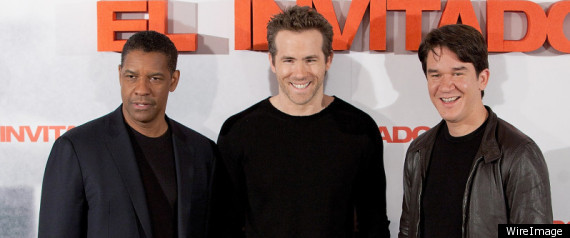
"Safe House," the CIA thriller, gives no overt indication that it is a foreign-language filmmaker's American feature debut. If anything, the film -- which features Denzel Washington as Tobin Frost, a CIA agent-turned-traitor, and Ryan Reynolds as Matt Weston, the young, idealistic, agent charged with keeping him in custody -- seems like a classic studio picture meant to bring out big audiences and churn out big popcorn sales. That's no mistake, either: Swedish filmmaker Daniel Espinosa ("Snabba Cash") synthesized a century of American cinematic history in an effort to deliver a movie that hits the beats familiar to Stateside ticket buyers.
Espinosa called The Huffington Post earlier this month to talk about the film.
This was your first English feature -- how was that experience, was it a big change for you?
It wasn't that big of a difference, it's a camera, it's a couple of actors and you have to make due with the time that you get. The only difference is that you have more time with the people involved. But basically, it's filmmaking, the same thing.
And you did it in South Africa -- what was the shoot like?
That was really cool. It's a country with such strong colors and such strong culture and so if you just put the camera out on the street, the pure vibe of the whole city will start influencing your work and the actors.
So you met with the studio and said you wanted to do the film your way, with your more unusual brand of filmmaking -- what are your trademarks as a director?
I did a movie called "Snabba Cash" and it has a fairly documentary style, and even though it's a gangster movie, it's based in characters. So I wanted to do an action movie with the people that actually have thoughts and feelings.
We find Denzel Washington's Tobin Frost to be a little more human than we'd expect; is it safe to call him an anti-hero?
Absolutely. I mean, he's the reluctant hero, he's the character who just wants to be an egotistical bastard, but throughout his journey, he meets this kid and he seems something in this kid that reminds him, of who he used to be before the world destroyed him. And I think that moves him, and I don't think he likes it
It isn't the most positive portrayal of the CIA; were you worried about how they'd react?
What, like they'd come crashing through my window?
Well, maybe that you'd be attacked in the press or people would react negatively.
I think in many ways, if you talk about being patriotic, I think it's a very American movie. The tradition in America has always been the cowboy. The cowboy doesn't ally himself with the rest of society or the government, he chooses to see right from wrong as strong as he can and he rides off alone in the end. That is the American hero journey, the lonely man.
It's interesting you say that; that's the legacy of American films, the John Wayne character, but do people from abroad still see that as the archetype?
John Ford, that's the base of American storytelling, and it's a huge part of your history, and it's also reflected in your politics. It's the self-made man. It's the man that arrives to the country and can create his own future with his own hands.
The film also tells a very contemporary story -- you have waterboarding scenes. Was the studio worried at all about showing Americans waterboarding people?
No, they were very supportive throughout the process to make a movie that was based in the reality we have today.
Why Ryan and Denzel for those roles?
You don't pick Denzel Washington, you ask him. With Denzel, he was only the one who should do the part. That's what I told everybody: if Denzel doesn't do it, I won't do it, because I thought this is the part he should have. If he didn't want to, I didn't think there was a movie there, because the character, how I worked with the writer, we designed it for him.
With Ryan, it was a meeting, I met with a lot of actors in his age group -- great actors -- and me and Ryan, we sat down and we spoke and we had a very strong connection. And I saw the work that he did in "Buried," I think it was a great piece of acting and directing, and I thought that there was something in Ryan that I wanted to investigate as a director. It's a journey we haven't done before.
What was that quality?
We just spoke about our lives and where we came from, and I could see in "Buried" that he had a core as a very strong actor and he had something that you almost could call a natural charisma, that, in many ways, Robert Redford had when he was young. But Robert never played into that charisma; he always played grumpy and he always played into the scenes, and I thought there was an opportunity with Ryan there was an opportunity to explore that.